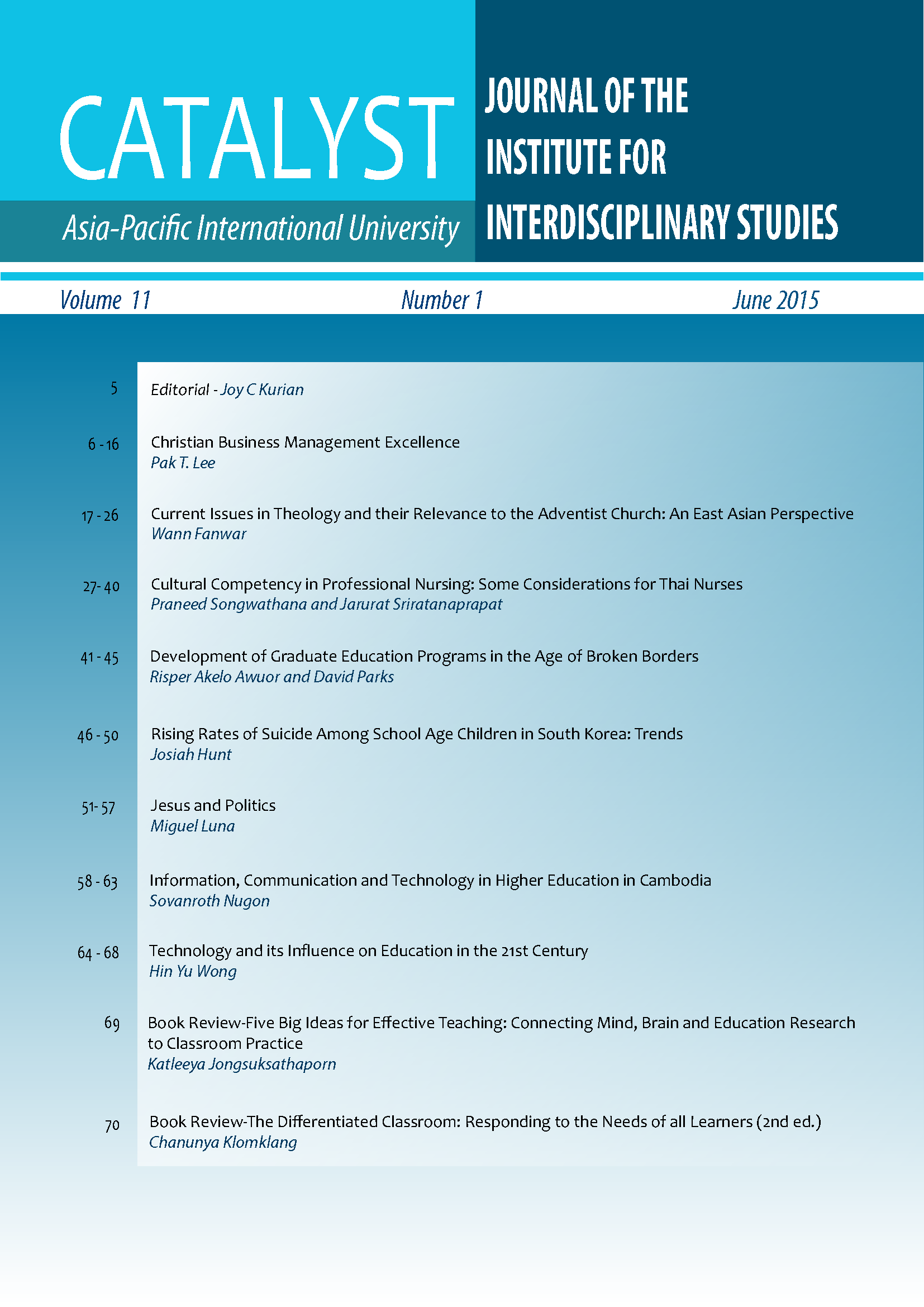Development of Graduate Education Programs in the Age of Broken Borders
Main Article Content
Abstract
We live in Friedman’s (2006) flat world with goods, services, ideas, people, and culture flooding across borders. There is increased social consciousness and a new awareness of the vulnerabilities and responsibilities of the nations that once felt secure behind closed borders. Borders are symbolic or real demarcations that restrict, define, enclose, isolate, separate, protect, constrain, blind, and limit. As physical borders fade, the impact of its degeneration on graduate education programs is clear. In this paper we present four of the major concepts that have changed the context of graduate education programs in the era of broken borders. Among the concepts that describe an evolving context of schooling that policy makers and practitioners at all levels of the educational enterprise in all parts of the world are dealing with are digitization, globalization, complexification, and cosmopolitanization. We describe and draw implications of each for schooling and the preparation of educational leaders, particularly at the graduate level. The implications are clear for those in educational faculties that it is time to embrace the digital revolution; and develop programs of study that integrate distance education components, mentorships, face-to-face instruction, student-to-student interaction, and cultural emersion. The influence of these concepts cannot be ignored by our educational systems. It is a reality that we must confront in the schools and classrooms at all levels. Preparation programs for school leaders should incorporate studies of this force that is restructuring and reforming the thinking of peoples throughout the world in order for children to live locally, but be able to think globally.
Article Details

This work is licensed under a Creative Commons Attribution-NonCommercial-NoDerivatives 4.0 International License.
Copyright: Asia-Pacific International University reserve exclusive rights to publish, reproduce and distribute the manuscript and all contents therein.
References
Blackman, S. (2012). The lowdown on the online MBA. Retrieved from http://EzineArticles.com/7184958
Dodd,D.(http://www.timeshighereducation.co.uk/news/are-scholarsor-executives-best-suited-to-leaduniversities/20140478.article) January 17, 2014
Downes, S., Siemens, G., and Cormier (2009). Personal Learning Environments, Networks and Knowledge. Columbia University Libraries. (n.d.). E-Resources. Retrieved from http://library.columbia.edu/ eresources/ebooks.html
Education online. (2006, October 16). U. S. News & World Report, 141, 62-66, 68-69, 70-72.
Fabunmi, B.A., Paris, M., & Fabunmi, M. (2006). Digitization of library resources: Challenges and implications for policy and planning. International Journal of African & African American Studies, 5(2), 23-36.
Friedman, T. L. (2005). The world is flat: A brief history of the twenty-first century (1st ed.). New York: Farrar, Straus and Giroux.
Friedman, T. L. (2006). The world is flat: A brief history of the twenty-first century (1st updated and expanded ed.). New York: Farrar, Straus and Giroux.
Girdano, D., Dusek, D. E., & Everly, G. S. Jr. (2012). Controlling stress and tension (9th ed.). USA: Benjamin Cummings.
Goldberg, P. K., & Pavcnik, N. (2007). Distributional effects of globalization in developing countries (No. w12885). National bureau of economic research.
Google. (2005). Library project – An enhanced card catalog of the world’s books. Retrieved from http://books. google.com/googleprint/library.html
Google. (2006). Google book search: News and views: History of google book search. Retrieved from http:// www.google.com/googlebooks/newsviews/history.html
Picciano, A. G. (2012). The evolution of Big Data and Analytics in American Higher Education, 16(3). Journal of Asynchronous Learning Networks.
Rantanen, T. (2005). Cosmopolitanization-now! An interview with Ulrich Beck. Global Media and Communication, 1(3), 247-263.
Richardson, V. (2006). Stewards of a field, stewards of an enterprise: The doctorate in education. In C. M. Golde & G. E. Walker (Eds.), Envisioning the future of doctoral education: Preparing stewards of the discipline (1st ed., Vol. Carnegie essays on the doctorate, pp. xviii, 450 p.). San Francisco, CA: Jossey-Bass.
Vaira, M. (2004). Globalization and higher education organizational change: A framework for analysis. Higher Education, 48(4), p. 483-510.


